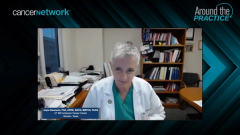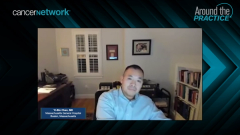
Treatment Options for Steroid-Refractory Acute GVHD
Clinicians discuss how they treat patients with steroid-refractory acute graft-vs-host disease and consider where ruxolitinib fits into the therapeutic landscape.
Episodes in this series

Parameswaran Hari, MD, MRCP: Nelson, before we move off of acute GVHD [graft-vs-host disease], could you summarize your approach to steroid-refractory acute graft-vs-host disease, given that steroids are the mainline treatment? The 50% of patients who respond immediately to steroids tend to do very well. On the other hand, the big problem for all of us is the steroid-refractory acute GVHD, where some progress has been made in the last couple of years. But let’s hear about your approach to acute GVHD that’s steroid-refractory.
Nelson J. Chao, MD, MBA: I want to start by reinforcing what Joyce and Yi-Bin said. And I want to remind the audience that the diagnosis of GVHD is a clinical diagnosis. There are no biomarkers, and there’s no pathology. We do biopsy the skin and the gut, but there are probably a dozen papers from transplant centers sending skin biopsies from patients with autologous and allogeneic transplants showing that the pathologists can’t tell the difference. This is a reminder to the group that we do this because it makes the doctor feel better to do biopsies and have it come back as GVHD. But it takes the clinician to decide whether that’s GVHD or not by ruling out other potential confounders.
We certainly see patients who don’t respond to steroids. We tend to think of steroid-refractory as those who don’t get better on at least 1 mg/kg for 3 days, and the steroid-resistant as those not getting better after 7 days. We move relatively quickly now that ruxolitinib is available. If they’re not responding to steroids at usually 2 mg/kg, we’ll start them on ruxolitinib. It’s not the easiest drug to use in the acute setting because of its hematological toxicities, but when it works, it works quite nicely for these patients.
Parameswaran Hari, MD, MRCP: Absolutely. What about the other agents that we’ve used over time, including infliximab, tocilizumab, mycophenolate, and mesenchymal stem cells? I tend to put all of them in the category of things that have been tried in a single-center or phase 2 study showing some benefit, but nothing has ever been proven in the randomized setting.
Nelson J. Chao, MD, MBA: That’s totally correct. There’s the kitchen sink after ruxolitinib. The thing that struck me the most was there were 300-plus patients in a randomized setting, which was really rare in this disease. We have lots of phase 2 data with these different drugs you mentioned showing responses, but many of these drugs failed in the phase 3 setting. We all sometimes see responses with things like infliximab, tocilizumab, or whatever other mab one wants to use, but it sometimes reflects the pathobiology of it, whether it’s truly GVHD.
Transcript edited for clarity.
Newsletter
Stay up to date on recent advances in the multidisciplinary approach to cancer.





































